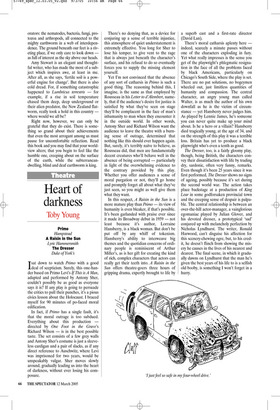Heart of darkness
Toby Young
Primo Hampstead A Raisin in the Sun Lyric Hammersmith The Dresser Duke of York’s Isat down to watch Primo with a good deal of scepticism. Surely, this one-hander based on Primo Levi’s If This is A Man, adapted and performed by Antony Sher, couldn’t possibly be as good as everyone says it is? If any play is going to persuade the critics to pull their punches, it’s a pious civics lesson about the Holocaust. I braced myself for 90 minutes of po-faced moral edification.
In fact, if Primo has a single fault, it’s that the moral outrage is too subdued. Everything about this production directed by One Foot in the Grave’s Richard Wilson — is in the best possible taste. The set consists of a few grey walls and Antony Sher’s costume is just a sleeveless cardigan and a pair of slacks, as if any direct reference to Auschwitz, where Levi was imprisoned for two years, would be unspeakably vulgar. Sher moves slowly around, gradually leading us into the heart of darkness, without ever losing his composure. There’s no denying that, as a device for conjuring up a sense of terrible injustice, this atmosphere of quiet understatement is extremely effective. You long for Sher to lose his temper, to give vent to the rage that is always just beneath the character’s surface, and his refusal to do so eventually forces you to supply the missing element yourself.
Yet I’m not convinced that the absence of any sort of catharsis in Primo is such a good thing. The reasoning behind this, I imagine, is the same as that employed by Rousseau in his Letter to d’Alembert, namely, that if the audience’s desire for justice is satisfied by what they’ve seen on stage they’ll be complacent in the face of man’s inhumanity to man when they encounter it in the outside world. In other words, Antony Sher and Richard Wilson want the audience to leave the theatre with a burning sense of outrage, determined that nothing like this should ever happen again. But, surely, it’s terribly naïve to believe, as Rousseau did, that men are fundamentally decent creatures who’ll behave well in the absence of being corrupted — particularly in light of the overwhelming evidence to the contrary provided by this play. Whether you offer audiences a sense of moral purgation or not, they’ll go home and promptly forget all about what they’ve just seen, so you might as well give them what they want.
In this respect, A Raisin in the Sun is a more mature play than Primo — its view of humanity is even bleaker, if that’s possible. It’s been garlanded with praise ever since it made its Broadway debut in 1959 — not least because it’s author, Lorraine Hansberry, is a black woman. But don’t be put off by any whiff of tokenism. Hansberry’s ability to interweave big themes and the quotidian concerns of ordinary people is reminiscent of Arthur Miller’s, as is her gift for creating the kind of rich, complex characters that actors can really get their teeth into. A Raisin in the Sun offers theatre-goers three hours of gripping drama, expertly brought to life by a superb cast and a first-rate director (David Lan).
There’s moral catharsis aplenty here indeed, scarcely a minute passes without one of the characters exploding in fury. Yet what really impresses is the sense you get of the playwright’s phlegmatic resignation in the face of all the problems faced by black Americans, particularly on Chicago’s South Side, where the play is set. There are no pat solutions, no bogeymen wheeled out, just limitless quantities of humanity and compassion. The central character, an angry young man called Walter, is as much the author of his own downfall as he is the victim of circumstance — yet Hansberry never judges him. As played by Lennie James, he’s someone you can never quite make up your mind about. Is he a hero or a villain? Hansberry died tragically young, at the age of 34, and on the strength of this play it was a terrible loss. Britain has yet to produce a black playwright who’s even a tenth as good.
The Dresser, too, is a fairly gloomy play, though, being British, the characters convey their dissatisfaction with life by trading dry, sardonic, often very funny, remarks. Even though it’s been 25 years since it was first performed, The Dresser shows no signs of ageing, possibly because it’s set during the second world war. The action takes place backstage at a production of King Lear in some godforsaken provincial town and the creeping sense of despair is palpable. The central relationship is between an over-the-hill actor-manager, a vainglorious egomaniac played by Julian Glover, and his devoted dresser, a prototypical ‘sad’ conjured up with melancholy perfection by Nicholas Lyndhurst. The writer, Ronald Harwood, can’t disguise his affection for this scenery-chewing ogre, but, to his credit, he doesn’t flinch from showing the misery he causes in the lives of his nearest and dearest. The final scene, in which it gradually dawns on Lyndhurst that the man he’s given the best years of his life to is a selfish old booby, is something I won’t forget in a hurry.
































































 Previous page
Previous page